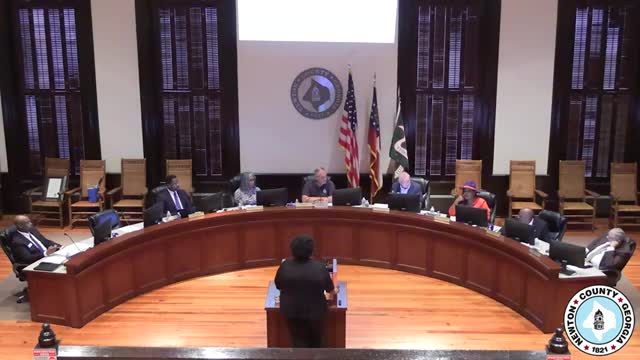Zoning Conflict Sparks Controversy Over Commercial Development
August 08, 2024 | Newton County, Georgia
This article was created by AI summarizing key points discussed. AI makes mistakes, so for full details and context, please refer to the video of the full meeting. Please report any errors so we can fix them. Report an error »

In a recent government meeting, officials discussed a pending appeal regarding a property owner’s rights and the implications of a proposed zoning change for two parcels located at Salem Road. The discussion highlighted the need to respect the property owner's appeal rights while addressing community concerns about zoning compatibility.
The meeting began with a reminder from a commissioner about the sensitivity of discussing the appeal's outcome publicly, emphasizing the importance of confidentiality in such matters. The focus then shifted to a proposed amendment concerning temporary building permits, specifically for the use of RVs on properties during construction. This amendment was approved without opposition.
The primary topic of the meeting was the zoning request for two parcels owned by Terrell Legacy, LLC, which are currently classified under a residential overlay tier despite being zoned for general commercial use since the 1970s. The parcels, totaling approximately 2.07 acres, are seeking to change their designation to Salem overlay tier three, which would allow for more appropriate commercial uses.
The planning commission had previously recommended denial of the request due to concerns about the types of commercial activities that could be established on the properties. In response, staff proposed conditions to prohibit certain businesses, including convenience stores and gas stations, to alleviate these concerns. The properties have been rendered non-conforming due to recent changes, including the demolition of existing structures by the Georgia Department of Transportation (GDOT) as part of a road widening project.
During the public hearing, supporters of the zoning change argued that the properties should be allowed to operate under their historical commercial designation, while opponents raised concerns about increased traffic and the lack of clarity regarding potential future businesses. The discussion underscored the ongoing tension between development and community impact, as officials aim to bring the zoning into compliance with current ordinances while considering the needs and opinions of local residents.
As the meeting concluded, the board of commissioners was tasked with weighing the merits of the zoning change against the backdrop of community feedback and the historical context of the properties involved.
The meeting began with a reminder from a commissioner about the sensitivity of discussing the appeal's outcome publicly, emphasizing the importance of confidentiality in such matters. The focus then shifted to a proposed amendment concerning temporary building permits, specifically for the use of RVs on properties during construction. This amendment was approved without opposition.
The primary topic of the meeting was the zoning request for two parcels owned by Terrell Legacy, LLC, which are currently classified under a residential overlay tier despite being zoned for general commercial use since the 1970s. The parcels, totaling approximately 2.07 acres, are seeking to change their designation to Salem overlay tier three, which would allow for more appropriate commercial uses.
The planning commission had previously recommended denial of the request due to concerns about the types of commercial activities that could be established on the properties. In response, staff proposed conditions to prohibit certain businesses, including convenience stores and gas stations, to alleviate these concerns. The properties have been rendered non-conforming due to recent changes, including the demolition of existing structures by the Georgia Department of Transportation (GDOT) as part of a road widening project.
During the public hearing, supporters of the zoning change argued that the properties should be allowed to operate under their historical commercial designation, while opponents raised concerns about increased traffic and the lack of clarity regarding potential future businesses. The discussion underscored the ongoing tension between development and community impact, as officials aim to bring the zoning into compliance with current ordinances while considering the needs and opinions of local residents.
As the meeting concluded, the board of commissioners was tasked with weighing the merits of the zoning change against the backdrop of community feedback and the historical context of the properties involved.
View full meeting
This article is based on a recent meeting—watch the full video and explore the complete transcript for deeper insights into the discussion.
View full meeting
